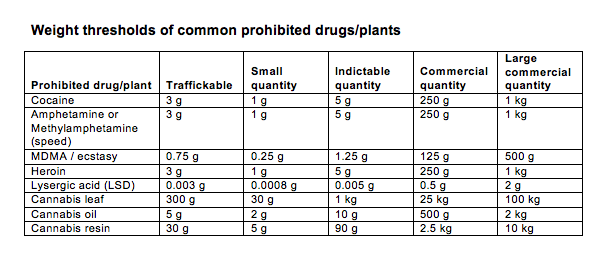Facing drug trafficking charges in New South Wales (NSW) can feel overwhelming. These charges carry severe penalties, and understanding the laws surrounding them is crucial for anyone navigating this complex legal landscape. Whether you are directly involved or trying to support someone else, knowing what constitutes drug trafficking and the potential consequences can make a significant difference.
In NSW, drug trafficking laws are strict, aiming to curb the distribution of illegal substances. However, the line between possession and trafficking is not always clear, and you might find yourself accused of a crime you did not intend to commit. By gaining insight into how these charges are defined, prosecuted, and defended, you can take informed steps towards protecting your rights.
Understanding the intricacies of drug trafficking charges is essential for ensuring the best possible outcome. With the right knowledge and support, you can face these challenges with confidence and clarity.
Key Takeaways
- Drug Trafficking Defined: Drug trafficking charges in NSW cover offences like distribution, manufacture, transportation, or sale of prohibited substances under the Drug Misuse and Trafficking Act 1985 (NSW).
- Severity of Penalties: Maximum penalties depend on the drug type and quantity, with larger quantities having higher maximum penalties. For example, large commercial supply of cannabis plant or leaf is 20 years imprisonment, but for any other type of prohibited drug (such as cocaine) carries life imprisonment. Where the offence involves less than large commercial quantity, the maximum penalty is 15 years imprisonment for cannabis leaf or plant, but 20 years imprisonment for any other type of drug.
- Deemed Supply Thresholds: NSW law uses specific drug weight thresholds to distinguish personal use from trafficking. If you are found in possession of a prohibited drug of or more than the defined “traffickable quantity”, it is presumed that you intended to supply that drug unless you prove it was for personal use only. The prescribed “traffickable quantity” varies depending on the drug. For cocaine, it is as little as 3 grammes. For ecstasy/MDMA, it is as little as 0.75 grammes.
- Defence Strategies Matter: An effective defence may include disproving intent to supply, challenging possession, or identifying procedural errors, such as unlawfully obtained evidence.
- Legal Expertise is Crucial: Hiring experienced lawyers ensures your rights are upheld and the prosecution case is rigorously tested. If you are guilty of a supply charge, having a competent team of lawyers can give you the best chance of a lesser sentence.
- Legal Consequences: Convictions result in criminal records, impacting employment, travel or visa eligibility, making it vital to prepare a robust defence.
Overview
Drug trafficking charges in NSW refer to offences involving the distribution, manufacture, transportation, or sale of prohibited drugs. These charges are regulated under the Drug Misuse and Trafficking Act 1985 (NSW), which sets out the legal framework for drug-related offences.
Penalties for drug trafficking depend on factors such as the type and quantity of the drug, the nature of the offence, and any prior convictions. For instance, possessing over a specific quantity of a prohibited substance, known as a traffickable quantity, may lead to a presumption of intent to supply under NSW law, even if you only had possession of the drug for personal use.
Key drugs involved in trafficking charges include substances like methamphetamine, cocaine, heroin, and cannabis. Law enforcement authorities assess the weight or quantity of the substance to determine whether charges escalate from personal use possession to trafficking.
Prosecutors use evidence such as testimony, intercepted communications, or possession of drugs exceeding a traffickable threshold to support their case. A legal evaluation of possession against trafficking intent often plays a critical role in defence strategies.
Indictable Quantity Supply
Quantities considered indictable denote more serious offences. 5 grammes of cocaine or methamphetamine or 1 kilogram of cannabis constitutes an indictable quantity. Such cases are typically tried in higher courts, with stricter penalties that may involve lengthy imprisonment.
Commercial Quantity Supply
Commercial supply involves substantial quantities, like 250 grammes of cocaine or 1.25 grammes of MDMA/ecstasy and 25kg of cannabis. These charges carry significant mandatory imprisonment terms, reflecting the offence’s gravity.
Large Commercial Quantity Supply
This is the most serious category, involving extreme amounts, such as 1.5kg of cocaine or methamphetamine and 100kg of cannabis. Large commercial supply charges can result in life imprisonment due to their severe impact on the community.
Understanding these categories is essential for assessing risks and preparing informed legal responses.
 Possessing the traffickable quantity or more puts you in the threshold of “deemed supply”, and you may be charged with drug supply even if it was for personal use only.
Possessing the traffickable quantity or more puts you in the threshold of “deemed supply”, and you may be charged with drug supply even if it was for personal use only.
Penalties and Implications of Drug Supply Charges
Penalties for drug supply offences in NSW are severe, varying based on the quantity of drugs and specifics of the offence. Legal provisions under the Drug Misuse and Trafficking Act 1985 (NSW) aim to deter drug-related activities and ensure harsh consequences for offenders.
Custodial Sentences
You may face imprisonment for any supply-related conviction, with the lengths of sentences escalating according to the category of supply. Large commercial supply can result in life imprisonment, while commercial supply often leads to minimum mandatory terms, such as 10 to 25 years for cocaine, heroin, or methamphetamine.
Financial Fines
Financial penalties are frequently imposed alongside custodial sentences. Depending on the type and quantity of drug, financial penalties may include up to $550,000.
Criminal Records
A conviction means that you have a criminal record, which can limit your travel opportunities, employment, and participation in certain professions. Certain convictions make visa or citizenship approvals difficult within Australia and abroad.
Aggravating Factors
You face harsher penalties if certain factors aggravate your charge, such as supply to a minor, ongoing supply, or being part of organised crime. Sentencing judges consider evidence of coercion, supply to vulnerable individuals, and prior records when determining the sentence.
Legal Consequences of Intent
Being charged based on possession exceeding a traffickable quantity introduces the presumption of trafficking under NSW law. Without evidence proving personal use, your case may shift towards trafficking, significantly raising penalties. Proactive legal defence is essential in such circumstances.
Possible Defences for Drug Supply Charges
Raising a strong defence can challenge the prosecution’s claims in drug supply cases.
- Lack of intent to supply: Arguing that you had no intention to supply drugs can serve as a partial defence. This would mean you are guilty of possession, which has a much lower maximum penalties.
- Duress: Claiming you acted under duress is valid when you can demonstrate coercion or threats forced your involvement. Evidence must show that a lack of choice existed at the time.
- Mistaken Identity: Establishing that you were not the person involved in the offence can serve as a defence. Effective cross-examination of prosecution witnesses is critical.
- Lack of Possession: Proving you were not in legal possession of the drugs can counter claims of supply. For instance, demonstrating that the drugs belonged to someone else may nullify possession allegations.
- Illegally Obtained Evidence: Challenging evidence obtained unlawfully, like an improper search or unauthorised surveillance, can weaken the prosecution’s case. Courts have the discretion to exclude such evidence.
Developing these defences depends on the case’s specific facts. Legal guidance ensures defences align with the Drug Misuse and Trafficking Act 1985 (NSW) framework.
The Legal Proceedings for Drug Supply Charges
Legal proceedings for drug supply charges in NSW follow a structured process dictated by the Drug Misuse and Trafficking Act 1985 (NSW). Once charged, you face a series of stages, starting with issuing a Court Attendance Notice. Depending on the severity of the alleged offence, it may remain in the Local Court or be elected to be dealt with on indictment in the District or Supreme Court.
Bail Application
You attend a bail hearing after the initial charge, where the court assesses whether you are eligible for release on bail. In cases involving large commercial quantities or aggravated circumstances, the court may impose stricter conditions or deny bail. Legal representation can improve your chances of securing bail.
Committal Proceedings
For serious charges, such as indictable or commercial supply, the case progresses through committal proceedings in the Local Court before being transferred to the District or Supreme Court for Sentence (in the case of a guilty plea) or Trial (in the case of a not guilty plea).
Guilty Plea
A guilty plea may lead to a sentence reduction, while a not guilty plea results in the matter proceeding to trial. Your plea reflects the defence strategy and consideration of the available evidence.
Pre-Trial Procedures
Pre-trial may include examining witness statements, evidence, and any legal arguments from both sides. You can challenge the admissibility of evidence, such as intercepted communications or improperly obtained drug samples, during this phase.
Trial
Cases tried in the District or Supreme Court involve the prosecution presenting its case before a judge or jury. Depending on the defence strategy, it may also involve presenting a defence or simply casting reasonable doubt over the prosecution’s case. In any case, you rely on your legal team to cross-examine witnesses, dispute evidence, and build arguments to undermine the prosecution’s case.
Sentencing
If found guilty, sentencing occurs based on factors such as offence severity, drug quantity, and mitigating or aggravating circumstances. Judges consider prior convictions, cooperation with law enforcement, and any demonstrated remorse when determining penalties.
Importance of Legal Expertise
Qualified legal practitioners help you interpret complex legal statutes and develop tailored strategies. Legal advice is essential for navigating pre-trial processes, bail applications, and trial defences. Lawyers ensure procedural compliance, reducing risks of procedural errors impacting your case.
If you’re dealing with drug charges, consulting an experienced solicitor is critical. The legal experts at Conditsis can assess your case, provide tailored advice, and advocate for your rights through every stage of the legal process. Taking proactive steps early on can help protect your future and ensure you are prepared for what lies ahead. Contact us today.


